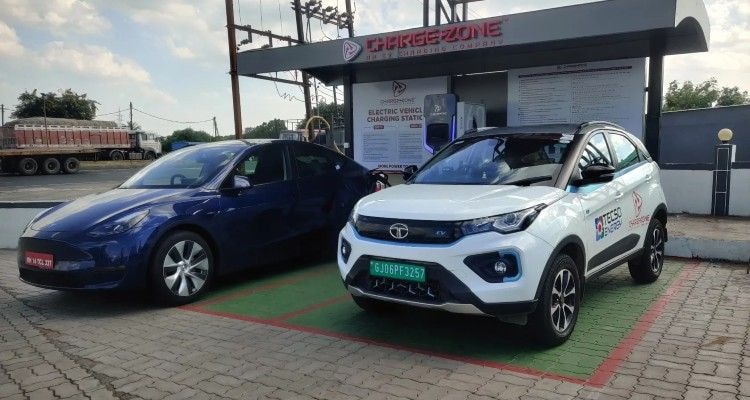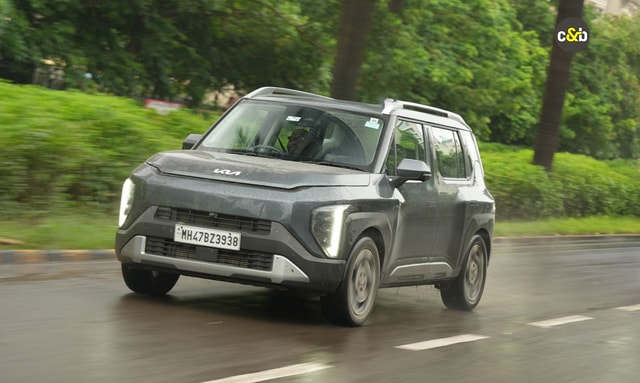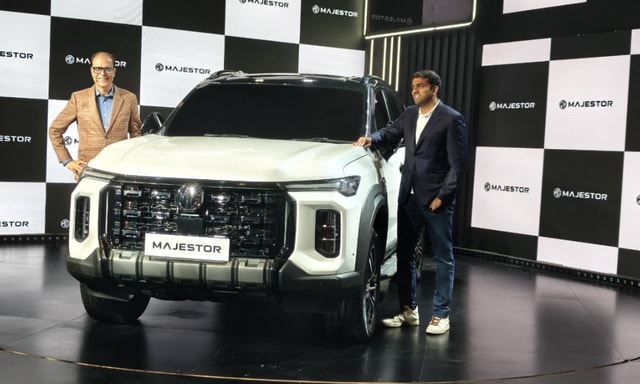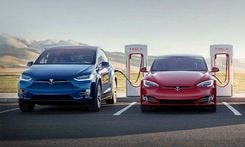India Finalises New EV Import Guidelines; Offers Conditional 15% Duty Rate

- 15 per cent import duty to apply to vehicles with landed value of over USD 35,000
- Manufacturers required to invest a minimum of Rs 4,150 crore into India operations
- Lowered import duty valid for 5 year period & for 8,000 units in a year
The Central Government has notified new guidelines for the sale of EVs by foreign manufacturers. Under the new guidelines, carmakers looking to import electric vehicles in the market are set to receive excise benefits such as lowered import duty if they agree to invest a minimum of Rs 4,150 crore (USD 500 million) in manufacturing operations in India.
Also read: Kia Carens Clavis EV Set To Debut In India In July
As per the new guidelines, EVs imported by foreign carmakers with a cost insurance and freight valuation of USD 35,000 (About Rs 30 lakh) and over will attract a lower excise duty of 15 per cent – down from the current 110 per cent. However, there is still a catch.
Carmakers will only be allowed to import up to 8,000 units a year for a 5-year period at the reduced import duty or until a predetermined monetary cap is met, whichever is earlier. The monetary cap is the lesser amount of either the amount invested in to commencing local operations (a minimum Rs 4,150 crore) or a maximum forgone duty of Rs 6,484 crore, whichever is lesser.
Also read: Tata Harrier EV Off-Road Features Previewed Ahead Of June 3 Launch
The policy states that unused quota from one year will be transferable to the next. Carmakers looking to import EVs under the scheme will be required to commence local assembly operations in the country within a three-year period while also achieving 25 per cent domestic value addition for the vehicle. This should rise to 50 per cent by the fifth year.
Also read: Maharashtra EV Policy 2025 Approved: Check Subsidies For Electric Scooters And Cars
The notification of the policy should finally open the doors to carmakers such as Tesla, which has already confirmed its India entry. This should allow the carmaker’s imported EVs to remain competitive in India despite being CBU imports, while it looks to commence its local assembly operations.
Latest News
 car&bike Team | Jan 19, 2026Skoda Kushaq Facelift Debut Tomorrow: What To ExpectFacelifted Kushaq to get updated looks and new tech inside the cabin.1 min read
car&bike Team | Jan 19, 2026Skoda Kushaq Facelift Debut Tomorrow: What To ExpectFacelifted Kushaq to get updated looks and new tech inside the cabin.1 min read Jaiveer Mehra | Jan 17, 20262026 Tata Punch Facelift Price, Variants ExplainedUpdated Punch is available in 8 trim levels with naturally aspirated petrol, CNG and turbo-petrol engine options.3 mins read
Jaiveer Mehra | Jan 17, 20262026 Tata Punch Facelift Price, Variants ExplainedUpdated Punch is available in 8 trim levels with naturally aspirated petrol, CNG and turbo-petrol engine options.3 mins read car&bike Team | Jan 17, 2026Skoda Kushaq Facelift Teased Ahead of Launch In Coming WeeksMid-lifecycle update to bring with it styling updates as well as new features inside the cabin.1 min read
car&bike Team | Jan 17, 2026Skoda Kushaq Facelift Teased Ahead of Launch In Coming WeeksMid-lifecycle update to bring with it styling updates as well as new features inside the cabin.1 min read car&bike Team | Jan 16, 2026Pierer Mobility AG Rebranded as Bajaj Mobility AG Following KTM TakeoverThis marks a major shift in ownership and strategic direction in the global motorcycle industry.1 min read
car&bike Team | Jan 16, 2026Pierer Mobility AG Rebranded as Bajaj Mobility AG Following KTM TakeoverThis marks a major shift in ownership and strategic direction in the global motorcycle industry.1 min read Seshan Vijayraghvan | Jan 16, 2026Kia Syros Variant Line-Up Expanded With HTK (EX) Trim; Prices Start At Rs. 9.89 LakhPositioned between the HTK (O) and HTK+ trims, the new variant will be offered in both petrol and diesel options.2 mins read
Seshan Vijayraghvan | Jan 16, 2026Kia Syros Variant Line-Up Expanded With HTK (EX) Trim; Prices Start At Rs. 9.89 LakhPositioned between the HTK (O) and HTK+ trims, the new variant will be offered in both petrol and diesel options.2 mins read car&bike Team | Jan 16, 2026MG Majestor India Launch On February 12Unveiled in India at the 2025 Bharat Mobility Expo, the Majestor is expected to be positioned as a more premium alternative to the Gloster.1 min read
car&bike Team | Jan 16, 2026MG Majestor India Launch On February 12Unveiled in India at the 2025 Bharat Mobility Expo, the Majestor is expected to be positioned as a more premium alternative to the Gloster.1 min read
 Amaan Ahmed | Jan 17, 2026Bajaj Chetak C25 First Ride Review: Basic, Likeable E-Scooter For First-Time RidersThe Chetak C25, in quite a few ways, is poles apart from the larger and more powerful 30 and 35 Series models, but in its mannerisms, it is very much a Chetak.8 mins read
Amaan Ahmed | Jan 17, 2026Bajaj Chetak C25 First Ride Review: Basic, Likeable E-Scooter For First-Time RidersThe Chetak C25, in quite a few ways, is poles apart from the larger and more powerful 30 and 35 Series models, but in its mannerisms, it is very much a Chetak.8 mins read Bilal Firfiray | Jan 9, 2026Toyota Urban Cruiser Hyryder: 10,000 km Long-Term ReviewAfter spending over three months and 10,000 km with the Toyota Urban Cruiser Hyryder Hybrid, we were impressed by its real-world mileage, seamless hybrid, practical comfort, and Toyota reliability. Is it the best C-SUV then?5 mins read
Bilal Firfiray | Jan 9, 2026Toyota Urban Cruiser Hyryder: 10,000 km Long-Term ReviewAfter spending over three months and 10,000 km with the Toyota Urban Cruiser Hyryder Hybrid, we were impressed by its real-world mileage, seamless hybrid, practical comfort, and Toyota reliability. Is it the best C-SUV then?5 mins read Seshan Vijayraghvan | Jan 8, 20262026 Mahindra XUV 7XO Review: Big On Tech, Bigger On ComfortThe new Mahindra XUV 7XO is flashier, feature packed, and comes with more advanced tech. But are the changes just incremental or actually substantial?1 min read
Seshan Vijayraghvan | Jan 8, 20262026 Mahindra XUV 7XO Review: Big On Tech, Bigger On ComfortThe new Mahindra XUV 7XO is flashier, feature packed, and comes with more advanced tech. But are the changes just incremental or actually substantial?1 min read Preetam Bora | Jan 10, 2026Simple One Gen 2 First Ride Review: 265 km Claimed Range!The Gen 2 model of Simple Energy’s first electric scooter gets a fair few updates, including new features, tech, more range and lighter weight. We spent a couple of hours with the Simple One Gen 2 to find out if it manages to impress.6 mins read
Preetam Bora | Jan 10, 2026Simple One Gen 2 First Ride Review: 265 km Claimed Range!The Gen 2 model of Simple Energy’s first electric scooter gets a fair few updates, including new features, tech, more range and lighter weight. We spent a couple of hours with the Simple One Gen 2 to find out if it manages to impress.6 mins read Amaan Ahmed | Jan 3, 2026VLF Mobster 135 300 KM Review: Fun But FlawedA 125 cc scooter with Italian design and Chinese genes is a rare combination, and while some may be tempted to dismiss it because of its origins, the VLF Mobster shows 125s can also be exciting – but not without compromises.11 mins read
Amaan Ahmed | Jan 3, 2026VLF Mobster 135 300 KM Review: Fun But FlawedA 125 cc scooter with Italian design and Chinese genes is a rare combination, and while some may be tempted to dismiss it because of its origins, the VLF Mobster shows 125s can also be exciting – but not without compromises.11 mins read






















































































































